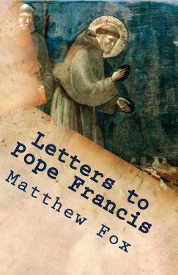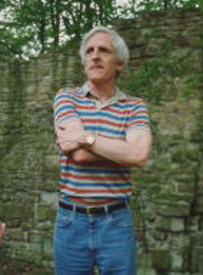 Imagine a “saw-horse” oil well pump looking first to the ground, then to the sky, and back again – over and over. That’s about how Dr. Machado looked as she lectured to us on the History of Christianity. She seemed to always look first at her notes, then to the same spot on the ceiling, and back to her notes – over and over.
Imagine a “saw-horse” oil well pump looking first to the ground, then to the sky, and back again – over and over. That’s about how Dr. Machado looked as she lectured to us on the History of Christianity. She seemed to always look first at her notes, then to the same spot on the ceiling, and back to her notes – over and over.
Her speed of lecturing was the fastest I have ever experienced, and there was no way I could keep up with writing notes. So, in a world that was working on Pentium 3 computers with the Pentium 4 about to be launched, I resurrected on old 386 laptop that someone had given me years before. It was so slow it wouldn’t even run Windows 3.1, so I took notes in WordPerfect 5.1 for DOS. I could almost keep up then.
Yet, occasionally, she’d pause long enough to step from behind the podium to go into more detail (or maybe even give some additional off-the-cuff insights not in her notes). One day, though I don’t remember the exact context, I remember her pausing to say something along the lines of, “Just because someone was labeled a heretic doesn’t mean they were wrong. It just means they lost.”
That was mind blowing to a guy like me who just a few months before used to listen to the likes of Chuck Swindoll, J. Vernon McGee, R.C. Sproul, and even James Dobson on the way home from work. They didn’t necessarily use the word “heretic” much, but the thought was definitely there. Despite where I had been, those two sentences opened me to be able to “hear” folks who were considered heretics – who may have thought differently than me or were not necessarily traditional or orthodox in their thinking. It helped make some of that “required” seminary reading seem more worthwhile.
Eventually, I found myself leading a Living the Questions study called Saving Jesus where I was introduced to Rev. Dr. Matthew Fox, a former Roman Catholic priest of the Dominican Order who was silenced by Cardinal Joseph Ratzinger (later elected Pope Benedict XVI) in 1989. When one of the members of that class recommended that we study one of his books, Original Blessing, I didn’t bat an eye. I was like, “Sure. Sounds like a great idea!” That book was a bit wordy, but it was extremely thought-provoking and inspiring in giving me a new vocabulary for understanding life, faith, and God – and the relation of all three! And it was certainly not orthodox or traditional.
 I found Letters to Pope Francis to be similarly thought-provoking and inspiring. Much less wordy than Original Blessing, it was much easier to read (though obviously not going nearly as in depth but also having a different purpose).
I found Letters to Pope Francis to be similarly thought-provoking and inspiring. Much less wordy than Original Blessing, it was much easier to read (though obviously not going nearly as in depth but also having a different purpose).
On one level, I felt a bit disconnected from the book, but that mainly stems from the fact that I’m a United Methodist Protestant Christian, and much of the book (as should be expected) deals directly with the Roman Catholic Church (RCC), examples being the lack of ordination of women and married priest as well as sexual misconduct of priests and the associated cover ups. These parts were somewhat interesting but had little bearing on me personally.
Where I felt most connected, though, was when Fox helped show similarities between the time of St. Francis of Assisi and our own and how Francis’ approach to his time can inform our approach to our own time. I came away wanting to study Francis more in depth as I learned much more than I knew before from this small volume.
Not only did Fox draw parallels between Francis’ time an ours, he also encouraged Pope Francis to live up to his namesake by employing some of the methods St. Francis used. In doing so, he was certainly critical of the RCC and the two previous Popes (not to mention the lack of effort to enact the reforms of Vatican II), but by and large, he was affirming of Pope Francis in what he has already done and said in his short tenure as Pope as well as his ministry prior to his election. Yet, Fox was not just handing out “attaboys.” He was encouraging the Pope to continue the work he has been doing and to go even further. Occasionally, he also gave some constructive criticism, but he did so gently (yet firmly) without being overly negative to the current Pope (a favor not afforded to the previous two Popes).
Many books like this speak of platitudes – high ideals – but wind up being simply rants with no plan of action. Thankfully, the book provides the beginning of what I think are practical steps for reforming the RCC and even Christianity as a whole. Drawing on his own experience of teaching and seeing Christianity being lived out in smaller communities, Fox offers real world examples of how things can be different. I really appreciate the fact that he allows most of Chapter 6, “Small Communities,” to be quotes (obviously chosen by Fox) from various small group participants giving insight into how they have seen grassroots reform taking place and working.
As one who is familiar with Fox might expect, his concern for social rights (especially those of the poor, women, and LGBTQ folk), social justice, lived faith vs. stale doctrine, and ecology shined through brightly. Likewise, his love of the laity and his desire to empower them for ministry (even in living out their daily jobs) was a beacon of hope. He rightly expands the call of the ministry of the laity beyond the typical understanding of “church work” to be the work people perform as “Doctors and business people, artists and teachers, therapists and social workers, carpenters and car repair specialists, farmers and journalists, inventors and policemen and women, nurses and builders and engineers and bankers. . . .” (pgs. 85-86) All of these add to the overall support of society and should be affirmed even if the task is not explicitly “Christian” – at least in a traditional understanding.
So, I heartily recommend this book to Pope Francis and all Christians, whether Catholic or Protestant. I also let Rev. Dr. Fox have the last word (including a quote from Pope Francis himself):
With all my heart I hope your papacy is one of compassion in it fullest and richest meanings and an example to other institutions of our world that compassion matters. And justice matters. You have said so yourself in the following words: “In the fact of grave forms of social and economic injustice, of political corruption, of ethnic cleansing, of demographic extermination, and destruction of the environment . . . surges the need for a radical personal and social renewal that is capable of ensuring justice, solidarity, and transparency.” pg. 41
 About the Author:
About the Author:
Matthew Fox holds a Ph.D. in spirituality, summa cum laude, from the Institut Catholique de Paris. His long career of teaching ministry includes founding the Institute of Culture and Creation Spirituality, which was shut down after 19 years under pressure from then-Cardinal Ratzinger whose pursuit of him and other theologians led to Fox’s “silencing” in 1989 and ultimate expulsion from the Dominican Order in 1993. He started the University of Creation Spirituality and is author of 31 books on spirituality and culture including Original Blessing, The Coming of the Cosmic Christ, A Spirituality Named Compassion, and Hildegard of Bingen: A Saint for Our Times.
He has been active as a priest in the Anglican community since being expelled from the Dominicans, teaching and working with youth to create a more just and compassionate world—one in keeping with the spirit of St. Francis. Fox is visiting scholar with the Academy for the Love of Learning in Santa Fe, New Mexico. Learn more at www.matthewfox.org.
Disclosure of Material Connection: I received this book free from the author and/or publisher through theSpeakeasy blogging book review network. I was not required to write a positive review. The opinions I have expressed are my own. I am disclosing this in accordance with the Federal Trade Commission’s 16 CFR, Part 255.

